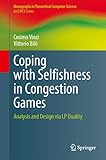Coping with Selfishness in Congestion Games [electronic resource] : Analysis and Design via LP Duality /
Material type: TextSeries: Monographs in Theoretical Computer Science. An EATCS SeriesPublisher: Cham : Springer International Publishing : Imprint: Springer, 2023Edition: 1st ed. 2023Description: XV, 186 p. 1 illus. online resourceContent type:
TextSeries: Monographs in Theoretical Computer Science. An EATCS SeriesPublisher: Cham : Springer International Publishing : Imprint: Springer, 2023Edition: 1st ed. 2023Description: XV, 186 p. 1 illus. online resourceContent type: - text
- computer
- online resource
- 9783031302619
- 004.0151 23
- QA75.5-76.95
Part I, Coping with Selfishness in Congestion Games: Introduction -- Part II, Analysis of the Performance of Congestion Games -- Part III, How to Improve the Performance of Congestion Games via Taxes -- Part IV, Other Strategies to Improve the Performance of Congestion Games. .
Congestion games constitute perhaps the most significant class of non-cooperative games because of their effectiveness in modeling several real scenarios. Since the advent of algorithmic game theory, characterizing the inefficiency of selfish behavior in these games, as well as defining good strategies to reduce it (in the same spirit of approximation and online algorithms’ design), have stood as fundamental challenges. This unique volume shows how these challenges can be addressed productively via linear programming and duality theory. In particular, the volume: Measures the efficiency of selfish behavior in several classes of congestion games Demonstrates how this efficiency changes when considering different solution concepts, different types of latency functions (from linear and polynomial, to very general ones) and different combinatorial properties of the players’ strategies (e.g., singleton strategies) Covers the analysis and design ofefficient online algorithms for machine scheduling and load balancing problems Utilises taxation mechanisms and Stackelberg strategies to improve the efficiency of selfish behavior, revealing that the performance of the proposed mechanisms is best possible within the considered category Formulates results based on the application of the primal-dual method—a powerful tool suited to prove good bounds on the performance guarantee of self-emerging solutions in congestion games This book is suitable for PhD (or master’s degree) students and researchers working in algorithmic game theory. In particular, it may serve as reference guide for those interested in deepening their knowledge on the fascinating field of the price of anarchy in congestion games and related topics. Vittorio Bilò is Associate Professor at the Department of Mathematics and Physics “Ennio De Giorgi” in University of Salento (Lecce, Italy). Cosimo Vinci is Assistant Professor at the Department of Information Engineering, Electrical Engineering and Applied Mathematics in University of Salerno (Fisciano, Italy).


There are no comments on this title.